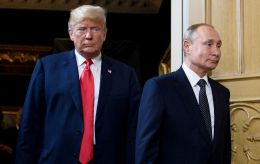South Korea reports North Korean troops' losses in Russia's war against Ukraine
 Photo: North Korean army lost 200 troops in Russia's war against Ukraine (Getty Images)
Photo: North Korean army lost 200 troops in Russia's war against Ukraine (Getty Images)
At least 100 North Korean soldiers stationed in Russia were killed and another 1,000 wounded during fierce fighting with Ukrainian troops in the Kursk region, South Korean MP Lee Seong-kweun told Reuters.
Lee said that according to intelligence, the heavy losses were attributed to the North Korean troops' lack of experience in using drones and their unfamiliarity with the open terrain in which they would have to engage in combat.
Lee spoke after a closed-door briefing by the National Intelligence Service (NIS) in parliament.
According to Lee, the discrepancy between the number of soldiers killed and the data of a US military official, who named several hundred victims, is explained by the relatively conservative analysis of the National Intelligence Service.
“There was a report that there have been at least 100 deaths and the injured are approaching 1,000,” he said.
According to Lee, there are signs that the North is preparing for additional troop deployments.
The report echoed comments by US and Ukrainian officials that North Korean casualties are heavy and that Russia is using them in large numbers to advance in the Kursk region.
According to US and South Korean officials, more than 10,000 North Korean soldiers have been sent to help Russia in the war. Pyongyang has also sent more than 10,000 containers of artillery shells, anti-tank missiles, mechanized howitzers, and rocket launchers.
Neither the North nor Russia has officially recognized the deployment of troops or arms shipments.
In June, Vladimir Putin visited Pyongyang and signed a "comprehensive strategic partnership” agreement with Kim Jong Un, which included a mutual defense pact.
Andrii Kovalenko, head of the Center for Countering Disinformation, said on December 18 that the North Korean army's losses in the Kursk region have already exceeded 200 troops.
President Volodymyr Zelenskyy said on December 16 that Russia had begun to involve soldiers from North Korea in the fighting in the Kursk region.

